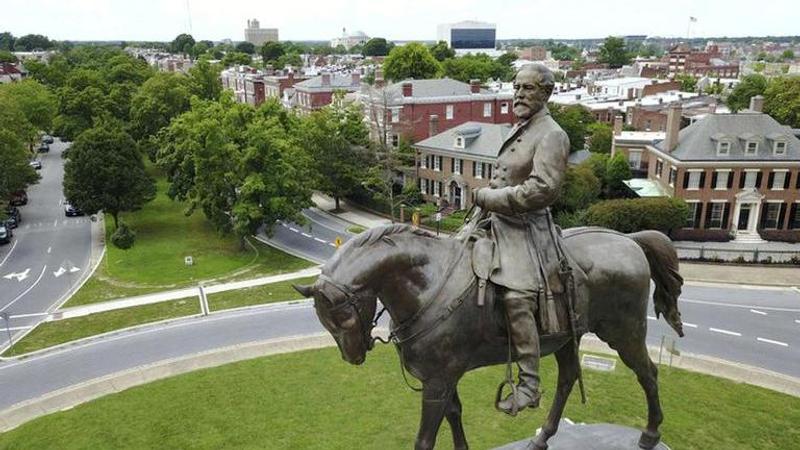Published 11:37 IST, August 4th 2020
Virginia gov faces new hurdle in bid to remove Lee statue
A judge dismissed a legal challenge Monday that had been blocking Virginia officials from removing a towering statue of Confederate Gen. Robert E. Lee from the state's capital city, but he immediately imposed another injunction against dismantling the figure.

A judge dismissed a legal challenge Monday that had been blocking Virginia officials from removing a towering statue of Confederate Gen. Robert E. Lee from the state's capital city, but he immediately imposed another injunction against dismantling the figure.
The new 90-day injunction bars Gov. Ralph Northam's administration from “removing, altering, or dismantling, in any way” the larger-than-life statue of Lee on a prominent Richmond avenue while claims in a lawsuit filed by local property owners are litigated.
Now covered in graffiti, the Lee monument has become a focal point and gathering spot amid Richmond's sustained anti-racist protests since the police custody death in Minnesota of a Black man, George Floyd . Northam announced plans in June to remove the statue, citing the pain felt around the nation by Floyd's killing.
Floyd's death sparked a renewed wave of Confederate monument removals across the U.S., just like a violent 2017 white supremacist rally in Charlottesville before it and a mass shooting at a historic African American church in South Carolina before that.
Should a court eventually clear the way, it won’t be a simple task to take down the 21-foot- (6.4-meter) equestrian statue of Lee, the military commander of the Confederacy that for nearly all of the Civil War had its seat in Richmond. The statue weighs about 12 tons (11 metric tonnes) and sits on a massive pedestal. Removal plan calls for cutting it into three sections for eventual reassembly elsewhere.
Richmond Circuit Court Judge W. Reilly Marchant wrote in the decision released Monday that “the public interest does weigh in favor" of a temporary injunction barring the statue's removal.
Separately, Marchant dismissed entirely as not “legally viable” the claims filed by a descendant of signatories to an 1890 deed that transferred the statue to the state, and he dissolved an existing injunction in that case.
Plaintiff William C. Gregory, the great-grandson of land donors, had argued the state agreed to “faithfully guard” and “affectionately protect” the statue on historic Monument Avenue that is among the most prominent Confederate tributes in the U.S. His attorney didn’t immediately respond to a request for comment.
The governor appreciates the dismissal of the Gregory case and “looks forward to another victory in court as soon as possible,” his spokeswoman, Alena Yarmosky, said in a statement.
“This statue will come down — and Virginia will be better for it,” she said.
In the property owners' case , Marchant found that the plaintiffs have the general standing to sue.
Four of the plaintiffs own property near statue; another is a trustee of a property owner. Among them is Helen Marie Taylor, a longtime Monument Avenue resident and defender of the statues. The group argues that removing the Lee statue — the last Confederate statue now standing on Monument Avenue — could result in the loss of the neighborhood’s National Historic Landmark designation, “which will have a substantial adverse impact, “ including the loss of ”favorable tax treatment and reduction in property values.”
In deciding whether to issue an injunction, Marchant considered one of their five claims — that they have a right to enforce restrictive covenants contained in deeds from 1887 and 1890 dealing with the statue and land it rests upon. The judge found that the plaintiffs are likely to succeed on that issue “under the common law doctrine of restrictive covenants running with the land.”
He said he would hear evidence and arguments on all five counts at another hearing. Court records did not indicate such a hearing has been scheduled.
University of Virginia law professor Richard Schragger said the judge’s ruling was “favorable” for the property owners.
“That doesn't mean the state can't prevail but that the judge has at least taken the basic facts and read them in a favorable light for the plaintiffs,” said Schragger, who teachers property law and whose scholarship includes a focus on the intersection of constitutional law and local government law.
He said he expects the case to end up before the Supreme Court of Virginia on appeal.
Virginia Attorney General Mark Herring has filed a motion to dismiss the property owners' lawsuit, and “remains committed to ensuring this divisive, antiquated relic is removed as soon as possible,” according to a statement from his spokeswoman, Charlotte Gomer.
Patrick McSweeney, an attorney for the property owners, has said he does not comment on pending litigation.
Updated 11:37 IST, August 4th 2020




